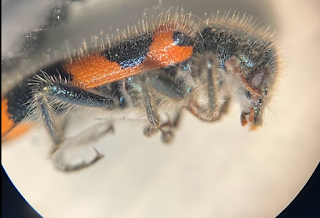Posted by John Murgel, Douglas County Extension
We get a pretty
regular supply of interesting insects coming through the Extension office as
folks find bugs in yards and gardens through the season. This time of year, with many native shrubs
and flowers coming into full bloom, is no exception. Flowers are entomological restaurants,
pick-up joints, and crime scenes; well worth spending a few minutes observing while
out in the garden (or on a hike!).
One of the common
groups of insects that is brought in for identification are termed “flower-visiting
beetles.” The adults are often seen on
open blossoms like sunflowers, asters, and rabbitbrush, sometimes in large
groups. These beetles are perhaps
sipping nectar, but don’t let this fool you—many are fierce predators of the
insect world.
This week a
sample of a flower-visiting clerid, or checkered beetle, came in. Checkered beetles, both as larvae and adults,
are almost all predators of other beetles—particularly bark beetles like ips or
mountain pine beetle. This particular
insect, though, was in the genus Trichodes, the bee-eating beetles. Most Trichodes prey on solitary bees
and wasps, laying sticky eggs on flowers for bees and wasps to inadvertently carry
to nest sites with them, where the eggs hatch and consume the bee larvae and the
food the mother bee stored up for it. A
few even accost hosts at flowers and riding back to nest sites in order to lay
their eggs near their bee-victims’. This
week’s beetle was, thankfully, less emotionally taxing for a gardener—its
larvae feed on the eggs of grasshoppers.
Adult beetles not
only eat pollen but also hunt a wide variety of insects smaller than
themselves. They are covered in
defensive bristles and have powerful, downward-pointing jaws to get the job
done. Their wings are a beautiful blue-purple
with red markings, possibly a warning-color mimicry of stinging insects used to
deter predators like birds.
 |
| Look at those jaws! |
A lot is going on
in the average garden, and much of it is inconsequential to our gardening
success. It sure is fun to watch,
though, and not for the first time I am grateful to be the size that I am and
not a grasshopper!



Wow, this blog is an absolute gem! The depth of research and insightful analysis presented here is truly commendable. Thank you for sharing such valuable information.
ReplyDeleteyoutube tv promo code 30 days
I often find myself lost in the engaging narratives you create. Your storytelling skills have a way of drawing readers in and making them feel like a part of the journey.
ReplyDeletelongleat voucher code
Your ability to connect with readers on a personal level is truly remarkable. Your openness and vulnerability create a sense of camaraderie that makes your blog feel like a safe space for self-expression.
ReplyDeletepalmetto state armory military